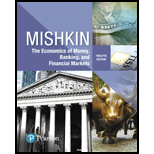
a.
Whether one would be more or less willing to buy a stock.
a.
Explanation of Solution
One would be less willing to buy a company’s stock if his/her wealth falls because if wealth falls then the individual would be extra careful about decisions related to investing his/her money. A fall in wealth would force investors to not invest in such options, where the chance of losing money is high.
Hence, an individual would be less willing to invest in a stock, if his/her wealth falls.
Introduction: Stock refers to a type of security that gives the investor ownership right in a company. There are two main types of stock: one is common stock, and another is
b.
Whether one would be more or less willing to buy a stock.
b.
Explanation of Solution
If one has an expectation that the stock
Hence, an individual would be more willing to invest in a stock, if he is expecting appreciation in price.
c.
Whether one would be more or less willing to buy a stock.
c.
Explanation of Solution
If a bond market becomes more liquid then individuals would be less willing to invest in stock because the stock market will become less liquid in comparison to the bond market. An investor always likes to invest more in that option which is of more liquid nature.
Hence, investors would be less willing to invest in a stock if the bond market becomes more liquid.
d.
Whether one would be more or less willing to buy a stock.
d.
Explanation of Solution
One would be less willing to buy a company’s stock if one thinks that the price of gold is going to rise because, in such a situation, an individual can earn more money by purchase of gold now and selling it later at profit.
Hence, one would be less willing to invest in a stock if one thinks that the price of gold is going to rise.
e.
Whether one would be more or less willing to buy a stock.
e.
Explanation of Solution
If the prices in the bond market become more volatile, then one would be more willing to invest in a stock because in such a situation stock market will become less risky in comparison to the bond market. So, normally every investor would like to invest in that option which will involve less risk.
Hence, investors would be more willing to invest in a stock if the prices in the bond market become more volatile.
Want to see more full solutions like this?
Chapter 5 Solutions
Economics of Money, Banking and Financial Markets (12th Edition) (What's New in Economics)
- Please provide the answer to these questions using informatioin from www.akleg.gov for Senate bill 30. What is their party affiliation?arrow_forwardPlease provide the answer to the question using information from www.akleg.gov for Senate Bill 30. How lonng have they been in public office?arrow_forwardPlease provide the answer to the following questions using www.akleg.gov website for Senate Bill 30. What District do they represent?arrow_forward
- Please provide the answer to this question using www.akleg.gov for Senate Bill 30? Do they hold any committe seats?arrow_forwardWhat impact does the North American Free Trade Agreement have on relations between countries in North America? NAFTA regulates and enforces protections for workers to ensure that they have safe working environments and fair wages. NAFTA eliminates tariffs and trade restrictions, facilitating export and import between countries in North America. NAFTA sets up regulations limiting industrial pollution in all three countries, ensuring the costs of manufacturing are similar in each country. NAFTA eliminates trade restrictions on products from embargoed countries.arrow_forwardWhich of the following is included in the GDP_________? Group of answer choices The two answers describe components of the GDP. The federal government expenditure on welfare payments. Households goods and services produced at home. Neither of the two answers describe components of the GDP.arrow_forward
- What are two examples of where historical cost is used within the financial statements. State both the account name and the amount for each account selected. What was the amount of revenue that Airbnb reported for 2024? Did the revenue grow over the prior year of 2023? What was the dollar and the percentage increase or decrease?arrow_forwardWhat was the amount of revenue that Airbnb reported for 2024? Did the revenue grow over the prior year of 2023? What was the dollar and the percentage increase or decrease? What was the amount of net income or net loss that Airbnb reported for the year of 2024? Did the net income increase or decrease versus the prior year of 2023? What was the dollar and the percentage increase or decrease?arrow_forwardWho are the Airbnb's independent auditors and what is the role of these auditors? What opinion do the Airbnb independent auditors express regarding the financial statements and what does this opinion mean to an investor?arrow_forward
- Does Airbnb's fiscal year-end coincide with a calendar year-end? What products and/or services does Airbnb sell? Please be detailed. What major industry does Airbnb operate in? name at least two competitors. What are two risks identified by Airbnb management? Describe these risks.arrow_forwardSolve please and thanks!arrow_forwardSolve please and thank youarrow_forward

 Principles of Economics (12th Edition)EconomicsISBN:9780134078779Author:Karl E. Case, Ray C. Fair, Sharon E. OsterPublisher:PEARSON
Principles of Economics (12th Edition)EconomicsISBN:9780134078779Author:Karl E. Case, Ray C. Fair, Sharon E. OsterPublisher:PEARSON Engineering Economy (17th Edition)EconomicsISBN:9780134870069Author:William G. Sullivan, Elin M. Wicks, C. Patrick KoellingPublisher:PEARSON
Engineering Economy (17th Edition)EconomicsISBN:9780134870069Author:William G. Sullivan, Elin M. Wicks, C. Patrick KoellingPublisher:PEARSON Principles of Economics (MindTap Course List)EconomicsISBN:9781305585126Author:N. Gregory MankiwPublisher:Cengage Learning
Principles of Economics (MindTap Course List)EconomicsISBN:9781305585126Author:N. Gregory MankiwPublisher:Cengage Learning Managerial Economics: A Problem Solving ApproachEconomicsISBN:9781337106665Author:Luke M. Froeb, Brian T. McCann, Michael R. Ward, Mike ShorPublisher:Cengage Learning
Managerial Economics: A Problem Solving ApproachEconomicsISBN:9781337106665Author:Luke M. Froeb, Brian T. McCann, Michael R. Ward, Mike ShorPublisher:Cengage Learning Managerial Economics & Business Strategy (Mcgraw-...EconomicsISBN:9781259290619Author:Michael Baye, Jeff PrincePublisher:McGraw-Hill Education
Managerial Economics & Business Strategy (Mcgraw-...EconomicsISBN:9781259290619Author:Michael Baye, Jeff PrincePublisher:McGraw-Hill Education





